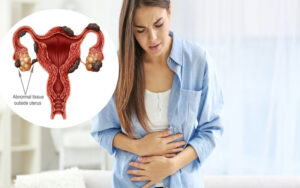
This tissue breaks apart and bleeds at the end of the menstrual cycle, just like ordinary uterine tissue. But there’s nowhere for this blood to go, which can lead to swelling and irritation around the surroundings. One may form lesions and scar tissue as well. The ovaries are the most common site of endometriosis. Moreover, it also affects the fallopian tubes and the tissues lining the pelvis. This comprehensive blog will discuss endometriosis and its related elements, including symptoms, causes and treatments. Additionally, we will explore where to find the best endometriosis treatment in Mumbai.
Symptoms of Endometriosis
One may not see any symptoms of endometriosis. When one gets them, they may consist of the following:
- back ache when menstruating
- severe cramping during menstruation
- discomfort during the menstrual cycle when urinating or pooping
- unusual or severe bleeding during the menstrual cycle
- blood in the pee or stools
- constipation or diarrhea
- unpleasant sexual encounters
- weariness that refuses to go
- having difficulties becoming pregnant
Causes of Endometriosis
It’s unclear what causes endometriosis specifically. However, a few potential reasons are as follows:
- Retrograde Menstruation. Menstrual blood flows back into the pelvic cavity through the fallopian tubes at this point rather than leaving the body. Endometrial cells from the uterus’ inner lining are present in the blood. These cells have the potential to adhere to the surfaces of the pelvic organs and walls. Over the length of each menstrual cycle, they can develop there and keep getting thicker and bleeding.
- Transformed Peritoneal Cells. Experts speculate that immunological factors or hormones may contribute to the transformation of peritoneal cells. The cells lining the inside of the abdomen into cells like those lining the uterus.
- Embryonic Cells Changes. During puberty, hormones like estrogen can change embryonic cells, which are still in the early stages of development, into growths that resemble endometrial tissue.
- Surgical Scar Complications. Endometrial cells may adhere to the scar tissue when an incision is created in the stomach region during surgery, like a C-section.
- Transport of Endometrial Cells. Endometrial cells may be transported to different areas of the body via the blood vessels or tissue fluid system.
- Condition of the Immune System. An immune system malfunction could prevent the body from identifying and eliminating endometrial tissue.
Risk Factors Affecting Endometriosis
- never bearing a child.
- getting menstruation early in life.
- going through menopause later in life.
- brief menstrual cycles, such as those lasting under 27 days.
- menstrual cycles that are heavy and extend beyond seven days.
- longer lifetime exposure to estrogen, the body produces or higher quantities of estrogen in the body.
- low BMI.
- one or more family members like a mother, aunt, or sister who have endometriosis.
Effective Endometriosis Treatment in Mumbai
- Pain Medication: To help lessen unpleasant menstrual cramps, a doctor might advise taking an over-the-counter pain treatment, such as non-steroidal anti-inflammatory drugs.
- Hormone Replacement Treatment: Menstrual hormonal imbalances cause endometrial implants to degrade, bleed, and thicken. Supplemental hormone therapy can stop endometrial tissue growth, prevent new implants, and reduce or eliminate pain. This endometriosis treatment is temporary.
- Hormonal Contraceptives: Vaginal rings, patches, and birth control tablets suppress hormones that induce monthly endometrial tissue growth. Hormonal contraception may lighten and shorten menstruation. For some endometriosis patients, hormonal contraceptive continuous-cycle regimens can eliminate pain.
- Hormones that Release Gonadotropin: Agonists & Antagonists: These medications interrupt menstruation and lower estrogen, inhibiting ovarian-stimulating hormone synthesis. This inhibits endometrial tissue growth. Gonadotropin-releasing hormone agonists and antagonists create an artificial menopause; therefore, adding a low dose of estrogen or progestin may reduce hot flashes, dry vagina, and bone loss. After stopping the medication, menstruation and pregnancy may resume.
- Progestin Treatment: Many progestin medications can stop menstruation and endometrial implant growth, reducing endometriosis symptoms. An intrauterine device containing levonorgestrel, contraceptive implant, injection, and progestin pill are included.
- Aromatase Inhibitors: Helps reduce estrogen levels. A doctor may prescribe an aromatase inhibitor and progestin or combined hormonal contraception for endometriosis.
- Conservative Surgery: Endometriosis patients who desire to get pregnant may benefit from surgery by removing the implants and maintaining the uterus and ovaries. Surgery may help severe endometriosis discomfort, but it may return. This treatment may be performed laparoscopically or by abdominal surgery in extreme cases. Most people with severe endometriosis can be treated laparoscopically.
- Treatment for Fertility: A gynaecologist might advise fertility treatment under the guidance of a fertility specialist. Treatments for infertility range from in-vitro fertilization to ovarian stimulation.
- Hysterectomy with Ovarian Excision: Surgery to remove the uterus and ovaries was one of the best endometriosis treatments. Endometrial specialists oppose this treatment. Menopause can result from ovarian detachment. Ovarian hormone deficiency may relieve endometriosis discomfort for some. Some patients still have pain from leftover endometrial-like cells following surgery. Early menopause raises the risk of metabolic diseases, cardiovascular issues, and more.
Consult the Top Gynaecologist in Mumbai for Endometriosis
One can consult Dr. Chaitali Mahajan Trivedi, MD (Obstetrics & Gynecology), a Cosmetic & Laparoscopic gynaecologist in Mumbai. She treats endometriosis successfully. After an extensive assessment, the doctor will advise the patient on the best course of action. Consult the doctor at Nanavati Super Speciality Hospital.



